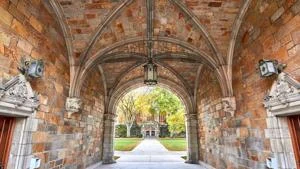The U.S. Department of Education has opened a foreign funding investigation into the University of Michigan after reports showed inaccurate and incomplete disclosures.
The department’s Office of General Council announced the investigation on Tuesday, following a number of high-profile cases involving the university.
“Despite the University of Michigan’s history of downplaying its vulnerabilities to malign foreign influence, recent reports reveal that UM’s research laboratories remain vulnerable to sabotage,” said Chief Investigative Counsel Paul Moore. “Including what the U.S. Department of Justice recently described in criminal charges as ‘potential agroterrorism’ by Chinese nationals affiliated with UM.”
Those criminal cases involved three arrests made by the FBI of Chinese foreign nationals, two of which were graduate students at the University of Michigan.
In early June, graduate student Yunqing Jian was arrested on charges of conspiracy, smuggling goods into the United States, false statements, and visa fraud.
Jian and her boyfriend, Zunyong Liu, are accused of smuggling a “dangerous biological pathogen” called fusarium graminearum into the United States to study.
According to statements Liu made to law enforcement, the fusarium graminearum was smuggled into the United States via the Detroit Metropolitan Airport. The couple then intended to use their access to the labs at the University of Michigan to research it.
Just a week later, graduate student Chengxuan Han was also arrested on charges of smuggling goods into the United States and making false statements.
At the time of Han’s arrest, authorities called it an “alarming pattern.”
“The alleged smuggling of biological materials by this alien from a science and technology university in Wuhan, China – to be used at a University of Michigan laboratory – is part of an alarming pattern that threatens our security,” said U.S. Attorney Jerome F. Gorgon Jr. “The American taxpayer should not be underwriting a PRC-based smuggling operation at one of our crucial public institutions.”
According to the DOE, the university has 30 days to produce a number of documents, including tax records related to foreign funding, written agreements with foreign governments or entities, a list of all university personnel and students involved in foreign partnerships, and more.
“Unfortunately, tens of millions of dollars in foreign funding in UM’s disclosure reports have been reported in an untimely manner and appear to erroneously identify some of UM’s foreign funders as ‘nongovernmental entities,’ even though the foreign funders seem to be directly affiliated with foreign governments,” said Moore.
A spokesperson for the university said it plans to comply with the investigation, which it is taking “extremely seriously.”
This is part of a broader set of investigations into foreign ties at universities across the country, as similar investigations have been opened at Harvard University, the University of Pennsylvania, and the University of California, Berkeley.
“Today’s investigation into UM reflects the Trump Administration’s ongoing efforts to hold colleges and universities accountable for failing to comply with federal disclosure laws on foreign funding,” said the statement from the DOE.
In January, the University of Michigan announced it would end its Joint Institute with Chinese Shanghai Jiao Tong University, following growing concerns from lawmakers about national security.
Currently, the Higher Education Act mandates disclosure of foreign gifts above $250,000 to federally funded universities, which the DOE said is meant to “protect national security and academic integrity by curbing undue foreign influence in higher education.”
Institutions not in compliance with these rules risk enforcement by the U.S. Department of Justice, which could include civil actions.
“As the recipient of federal research funding, UM has both a moral and legal obligation to be completely transparent about its foreign partnerships,” Moore said. “OGC will vigorously investigate this matter to ensure that the American people know the true scope of foreign funding and influence on our campuses.”
In the last few months, legislation has been proposed both in Congress and the Michigan House of Representatives to curtail the relationship between American universities and foreign countries. The federal legislation would ban visas for students from China, while the Michigan legislation would prohibit Michigan colleges from certain foreign partnerships.






